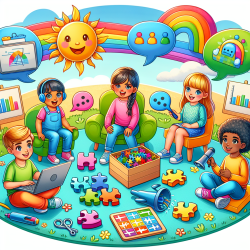Introduction
The COVID-19 pandemic has significantly impacted childcare centers, affecting both educators and young children. The study titled "Designing a virtual mental health consultation program to support and strengthen childcare centers impacted by COVID-19: A randomized controlled trial protocol" provides crucial insights into how virtual mental health consultation programs can aid in building resilience in these settings. This blog explores the study's findings and offers practical advice for practitioners looking to enhance their skills and outcomes for children.
Understanding the Impact
The pandemic has exacerbated psychosocial issues among children, including anxiety, irritability, and stress. Childcare centers, already under pressure, face additional challenges in supporting children's mental health. The study highlights the importance of Early Childhood Mental Health Consultation (ECMHC) in addressing these challenges by equipping educators with the necessary skills to foster resilience in children.
The Virtual Consultation Approach
The study introduces a novel approach using the Jump Start+: COVID-19 Support (JS+CS) virtual toolkit, delivered through telepresence robots like Kubi. This approach offers several advantages:
- Reduces travel time and increases accessibility for mental health consultants.
- Provides a real-life, face-to-face experience for educators and consultants.
- Allows for effective observation and feedback on classroom practices.
By utilizing this technology, childcare centers can continue to receive essential support while adhering to safety protocols.
Implementing the Toolkit
The JS+CS toolkit is structured around four pillars: Safety Planning, Effective Communication, Adult Self-Care, and Trauma-Informed Behavior Support. These pillars are designed to enhance resilience and psychosocial functioning in children and educators. Practitioners can implement these strategies by:
- Engaging in regular virtual consultations with mental health consultants.
- Participating in training sessions focused on self-care and trauma-informed practices.
- Collaborating with parents and caregivers to reinforce positive behaviors at home and in the classroom.
Overcoming Challenges
While the virtual consultation approach offers numerous benefits, practitioners may face challenges such as technology adoption and treatment non-compliance. To address these issues, the study recommends:
- Providing comprehensive training and support for educators in using telepresence technology.
- Developing a sustainability plan to ensure long-term success and adherence to toolkit strategies.
- Utilizing a multi-method approach to measure outcomes and adjust strategies as needed.
Encouraging Further Research
Practitioners are encouraged to explore further research on the long-term impacts of COVID-19 on childcare centers and the effectiveness of virtual consultation programs. By staying informed and adapting to new evidence-based practices, educators can continue to support children's development and resilience.
To read the original research paper, please follow this link: Designing a virtual mental health consultation program to support and strengthen childcare centers impacted by COVID-19: A randomized controlled trial protocol.










